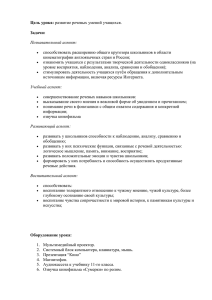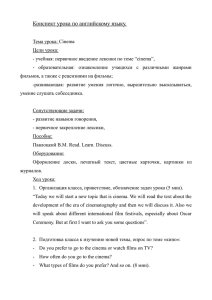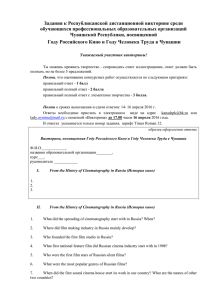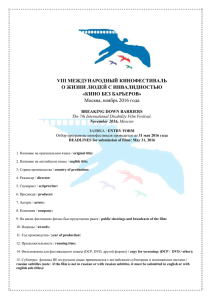HOLLYWOOD
реклама
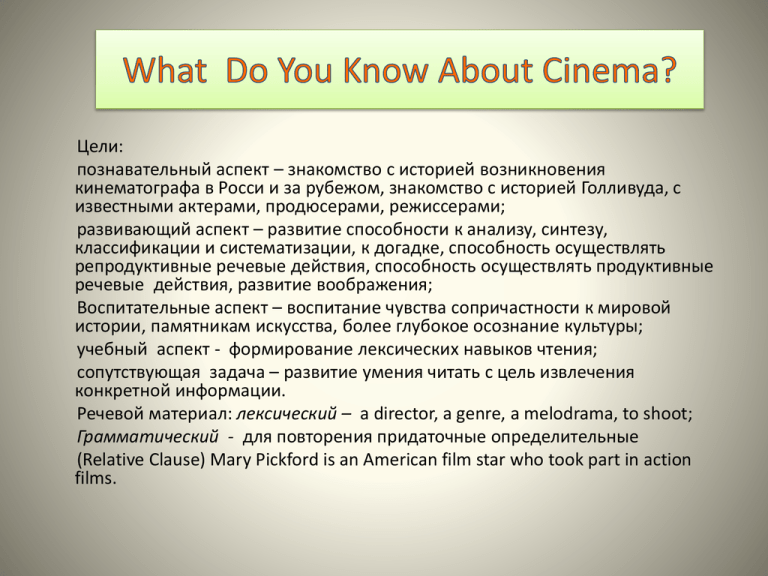
Цели: познавательный аспект – знакомство с историей возникновения кинематографа в Росси и за рубежом, знакомство с историей Голливуда, с известными актерами, продюсерами, режиссерами; развивающий аспект – развитие способности к анализу, синтезу, классификации и систематизации, к догадке, способность осуществлять репродуктивные речевые действия, способность осуществлять продуктивные речевые действия, развитие воображения; Воспитательные аспект – воспитание чувства сопричастности к мировой истории, памятникам искусства, более глубокое осознание культуры; учебный аспект - формирование лексических навыков чтения; сопутствующая задача – развитие умения читать с цель извлечения конкретной информации. Речевой материал: лексический – a director, a genre, a melodrama, to shoot; Грамматический - для повторения придаточные определительные (Relative Clause) Mary Pickford is an American film star who took part in action films. Cinema Theatre Opera Musical Cartoons HOLLYWOOD The world capital of filmed entertainment Los Angeles has been a lot of things over the past 100 years. First it was a little city with orange forest and great weather. But, one day in 1908 a group of people from Chicago came to Los Angeles to shoot a film. Since that day a lot of directors, producers, actors and thousands of other workers have been coming to Los Angeles. In 1911 the first studio appeared in Hollywood (a part of Los Angeles). In the 1920s Hollywood made 80% of the world’s films. Silent and blackand-white films of those early years starring Mary Pickford and Charlie Chaplin were forced out by sound films in the middle of 1920. Full-length films came up to take place of short films. And the first colour film, Gone with the Wind, was shot in 1939. This film brought a great success to Vivien Leigh and Clark Gable who starred in the film. The number of the studios grew very quickly. They combined in large corporations and the biggest film companies are MGM, Paramount, 20th Century Fox, Columbia Pictures, Warner Bros, and Universal. The first genres of American films were melodrama, western and comedy, later appeared adventured and historical films. But now the range of genres is much richer. Hollywood got the name of the factory of dreams. It is associated with wealth and paradise of sun and palm trees. But it is only a facade for a darker truth. HOLLYWOOD First it was a little city with orange forest and great weather. The world capital of filmed entertainment Los Angeles has been a lot of things over the past 100 years. Since that day a lot of directors, producers, actors and thousands of other workers have been coming to Los Angeles. But, one day in 1908 a group of people from Chicago came to Los Angeles to shoot a film. Full-length films came up to take place of short films. And the first colour film, Gone with the Wind, was shot in 1939. This film brought a great success to Vivien Leigh and Clark Gable who starred in the film. The number of the studios grew very quickly. They combined in large corporations and the biggest film companies are MGM, Paramount, 20th Century Fox, Columbia Pictures, Warner Bros, and Universal. In 1911 the first studio appeared in Hollywood (a part of Los Angeles). The first genres of American films were In the 1920s Hollywood made 80% of the world’s films. Silent and black-and-white films of those early years starring Mary Pickford and Charlie Chaplin were forced out by sound films in the middle of 1920. melodrama, western and comedy, later appeared adventured and historical films. But now the range of genres is much richer. Hollywood got the name of the factory of dreams. It is associated with wealth and paradise of sun and palm trees. But it is only a facade for a darker truth. corporations professions Mary Pickford Hollywood film making process films genres melodrama What are these people famous for? Eddie Murphy Charlie Chaplin Walt Disney Clark Gable Кто это? An English film actor and director. He made his reputation as a tramp with a small black moustache, bowler hat, and twirling cane in silent comedies from mid-1910s, including The Rink (1916), The Kid (1920), and The Gold Rush (1925). Кто это? A US film maker and animator, a pioneer of family entertainment. He established his own studio in Hollywood in 1923, and his first Mickey Mouse cartoons appeared in 1928. In addition to short cartoons, the studio made feature-length animated films, including Snow White and Seven Dwarfs (1938), Pinnocchio (1940), and Dumbo (1941). His cartoon figures, for example, Donald Duck, also appeared in comic books worldwide. In 1955 he opened the first theme park in California. Кто это? Indian born English actress. She appeared on the stage in London and New York, and won Academy Awards for her performances as Scarlett O’Hara in Gone with the Wind (1939) and as Blanche du Bois in A Streetcar Named Desire (1951). Her other films include Lady Hamilton (1941), Anna Karenina (1948). Кто это? An American film actor. A star for more than 30 years in 90 films, he was celebrated for his romantic roles such as Rhett Butler in Gone with the Wind (1939). Кто это? A US film director, writer and producer. His credits include such phenomenal box-office successes as Jaws (1975), Jurassic Park (1993). He also directed Indiana Jones and the Temple of Doom (1984), Hook (1991) and totally different Schindler’s list (1993) for which he received Academy Awards for Best Film and Best Director. Кто это? An American actor and comedian who first became known for his work on television programme Saturday Night Live but now is known mostly for his films, such as Trading Places and Beverly Hills Cop. The beginning of cinema in Russia In April 1896, just four months after the first films were shown in Paris, the first cinematic apparatus appeared in Russia. The first films seen in the Russian Empire were via the Lumière brothers, in Moscow and St. Petersburg in May 1896. In the same month, the first film was shot in Russia, by Lumière cameraman Camille Cerf, a record of the coronation of Nicholas II at the Kremlin in Moscow. The first permanent cinema was opened in St Petersburg in 1896 at Nevsky Prospect, No. 46. The first Russian movies were shown in the Moscow Korsh theatre by artist Vladimir Sashin. After purchasing a Vita graph projector, Sashin started to make short films, which by August 1896 were being demonstrated to theatre audiences after the theatre performance had ended.





